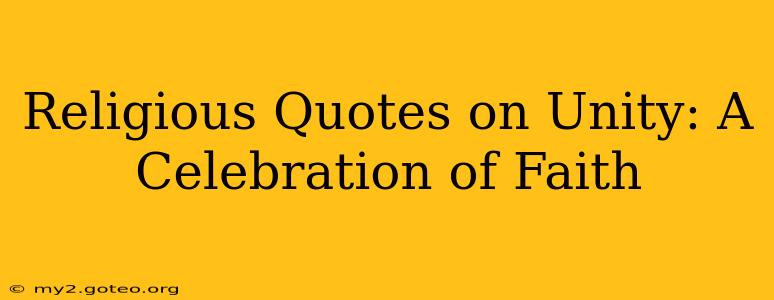Religious traditions across the globe emphasize the importance of unity, harmony, and shared humanity. These beliefs often find expression in powerful and inspiring quotes that resonate with people of diverse faiths and backgrounds. This exploration delves into a collection of such quotes, highlighting their significance and the enduring message of togetherness they convey. We'll examine the core values behind these messages and explore how they can inspire us to build a more unified and peaceful world.
What are some famous quotes about unity from different religions?
This is a question that deserves a multifaceted answer, as different religions express the concept of unity in unique ways. Here are a few examples spanning several faith traditions:
-
Christianity: "A new command I give you: Love one another. As I have loved you, so you must love one another. By this everyone will know that you are my disciples, if you love one another." - John 13:34-35 (NIV). This verse emphasizes the unifying power of love as the defining characteristic of Christian discipleship. The emphasis is not on doctrinal agreement, but on mutual love and respect.
-
Islam: "Indeed, the believers are but brothers. So make reconciliation between your brothers and fear Allah that you may receive mercy." - Quran 49:10. This verse underscores the brotherhood of believers within the Muslim faith and encourages reconciliation and unity amongst them. The emphasis on mercy and compassion extends beyond the individual to the wider community.
-
Buddhism: "Just as all rivers flow into the sea, so all things, all beings, return to the Dharma." This isn't a direct quote from a specific Buddhist text but represents the core principle of interconnectedness that underpins Buddhist teachings. All beings are connected and interdependent, flowing towards enlightenment together.
-
Hinduism: "Vasudhaiva Kutumbakam" – This Sanskrit phrase translates to "The world is one family." This ancient proverb encapsulates the Hindu concept of universal brotherhood and the interconnectedness of all life. It promotes a sense of shared humanity and mutual responsibility.
-
Judaism: "Love your neighbor as yourself." - Leviticus 19:18. This commandment, central to Jewish teachings, emphasizes the importance of compassion, empathy, and mutual respect within the community and beyond. It promotes a sense of shared humanity and mutual responsibility.
How can religious quotes on unity promote peace and understanding?
Religious quotes on unity act as powerful tools for fostering peace and understanding in several ways:
-
Shared Values: These quotes highlight common ethical and moral principles across different faiths, emphasizing the shared humanity beneath superficial differences. Focusing on these shared values can bridge divides and foster a sense of common purpose.
-
Inspiration and Motivation: These inspirational words can motivate individuals to strive towards a more unified and harmonious world. They provide a framework for ethical behavior and social justice.
-
Dialogue and Understanding: Using these quotes as a starting point for interfaith dialogue can help people of different faiths understand and appreciate each other's perspectives better. This mutual understanding can be crucial in resolving conflicts and promoting cooperation.
-
Challenging Division: These quotes directly challenge divisive ideologies and practices by reminding us of our shared humanity and interconnectedness. They serve as counterpoints to narratives that promote conflict and hatred.
What are the challenges to achieving unity despite these inspirational messages?
While religious texts and figures offer powerful messages of unity, the reality often falls short. Several factors contribute to this:
-
Interpretational Differences: Religious texts are often open to multiple interpretations, leading to differing understandings of core principles and resulting in internal and interfaith conflicts.
-
Political and Social Conflicts: Political and social issues often intersect with religious beliefs, leading to divisions and conflicts. Religious identities are sometimes exploited for political gain, undermining the message of unity.
-
Historical Grievances: Past conflicts and injustices based on religious identity leave lasting scars that hinder the fostering of unity. Reconciliation requires addressing these historical wounds openly and honestly.
-
Extremism and Fundamentalism: Extremist groups often misuse religious texts and traditions to justify violence and intolerance, directly contradicting the messages of peace and unity found in many faiths.
How can we use religious quotes on unity to inspire action today?
The power of these quotes lies not just in their contemplation but in their application. We can actively use them to promote unity in our daily lives by:
-
Interfaith Dialogue: Engaging in respectful and meaningful conversations with people of different faiths.
-
Community Building: Participating in interfaith events and initiatives that foster collaboration and understanding.
-
Advocacy for Justice: Speaking out against injustice and inequality that disproportionately affect certain religious communities.
-
Personal Reflection: Reflecting on the meaning of unity in your own faith and how you can live out these values in your daily life.
By actively engaging with these powerful messages of unity, we can strive towards a more peaceful and harmonious world, reflecting the shared values of compassion, understanding, and love found across religious traditions.

